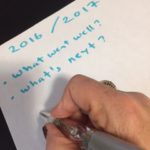UPDATE: There’s a brand new set of questions for Dec 2020/Jan 2021! Get them here: Before you kick 2020 to the curb ask these 12 Questions
—
Note: A version of this article was also published at the Globe and Mail as well as the Huffington Post
The end of the year is a time to reflect, take stock of the year past, and plan for the year ahead. Each year I share an article with 12 questions to help guide a year-end reflection. A year has passed yet it feels like a nano-moment since the last year-end reflection. Not surprising – our lives, work and society move at an unprecedented pace.
This year’s questions touch on this theme of ‘pace and change’ which I wrote about in another blog post (with Six Must Knows to Thrive in the Innovation Economy) earlier this year and a Globe and Mail article (“Are You Ready for the Innovation Economy?”). Whether you identify with the innovation notion or not, the core message is that significant forces are creating seismic changes in how we live and work. No one individual, organization, or even sector is immune from the disruptive changes at play. A few years back taxi drivers, photo technicians, music/video stores, and travel agents may have been the early face of this disruption narrative — but today even those with seemingly steady careers within traditionally stable sectors like banking, financial services, and other areas – are confronting new realities.
With opportunities and threats abound we all need to be on our best toes as we head into the new year. To help you take stock and prepare for the year ahead take time to reflect on this year’s questions.
THE YEAR BEHIND:
1) What went well? This is a staple question I ask each year. It’s far too easy to bypass the wins and the good that comes within any year. When working hard, fast, and often in challenging contexts, our brains tend to erase the positive as we focus on the loads and pressures at hand. But remembering the good fuels our wellbeing and gives us internal resources to step up to the challenges. Take stock of what went well this year and know that nothing is too small to own, celebrate and bring forward as positive fuel for the days and year ahead.
Of course, it can also be useful to acknowledge what might not have gone so well — especially if you can learn from those circumstances and/or at least be grateful for having worked through them. Acknowledging the good isn’t about suppressing what needs to be expressed. The next few questions might, in fact, give you some food for thought to mine for meaning from those tougher moments of 2016.
2) What surprised you? (U.S, elections aside) life is always full of surprises and these days more so than ever. Whether for better or otherwise, the skills of the day are adaptability, heartiness, and resourcefulness. Reflect on the surprises that came your way – and then on how you responded. What do you notice about your ability to adapt and pivot within the unexpected? Those who are nimble and quick are better primed to seize opportunities and work with change. Resistors insisting on certainty and/or the same way of doing things can find themselves stressed out and side-lined.
3) What did this year teach you? Every experience for better or worse can be a ‘teacher’ if we use it well. How did you grow from your year? What insights, knowledge, skills were gained or reinforced? Consider those beyond just the technical skills by reflecting on skills related to self awareness, trust, adaptability, resourcefulness, resilience. These core internal skills are critical today and will stead you well in the year(s) ahead.
4) What are you noticing or even having hunches about? Sometimes if feels like change comes out of the blue. But often there are early signs and/or hints abound. Think about the year past and your world of work (and life). What signs or even inklings of change need to be heeded? Where might the opportunities come from? What are you ignoring that can put you at risk? Paying attention with an open mind and some self trust can prepare you better for even the seemingly unknown.
5) What needs to be left behind? Old ideas, poor habits, and self-limiting behaviours – ahh, who doesn’t have at least a few of these? When life and work pressures demand the best of us it is a good idea to take stock of what’s no longer working and might be holding us back. Also, ask yourself if it’s time to let some doors close this year (if they must) and shift your energy to new areas of opportunity? Where do you need to discard ideas, strategies, and ways of doing things that don’t work any more despite your best efforts? Perhaps there might even be relationships that need to be let go or less heavily invested in?
6) Wrap up your year with a name that fits: Give 2016 the distinctive, memorable quality it deserves by considering the stand-out experiences and lessons and complete this phrase: “2016 was the year of ___.
THE YEAR AHEAD:
7) Where do you need to go next? Think about the changes showing up (internally and externally). What’s next for you professionally and personally? Even if you don’t have precise answers yet, staying in this question will keep you on your toes so that you can plan and pivot to opportunities more easily. To paraphrase the famous words conveyed by Wayne Gretzky, ‘focus on where the puck is headed and skate towards there.’
8) How will you evolve in the year ahead? While you can’t predict the whole picture, it’s a good idea to get intentional in your development and identify new skills, experiences and knowledge that will help you grow. Visualize yourself at the end of 2017 and ask in what ways will you have grown? This is your chance to reflect so you can plan for this to happen.
9) What are your top goals? Now it’s time to get specific and concrete. Forget resolutions – they don’t work. But goals – if meaningful, relevant and backed up with a plan — can provide focus, direction, a sense of purpose, and energize you with new motivation. Got any goals for yourself?
10) Who will you connect with? Don’t wait for sudden change to test the strength of your network and relationships – invest now. Take stock and make a commitment to connect meaningfully, authentically with those important to you. Expand and/or deepen your professional and personal network and find ways to show reciprocity by giving back to others.
11) How will you navigate ambiguity and uncertainty? Ambiguity and uncertainty often comes with disruptive change. How do you cope (thrive) in the unknown? Those who do well tend to foster flexible, resilient, hearty mindsets – along with other skills. Take heed, if not yet natural strengths, know that we can all tap into our deep-rooted capacities to adapt, learn, and find heartiness even in challenging conditions. Start by setting the intention and then commit. Then don’t be afraid to seek support in developing these skills.
12) What’s your mantra for 2017: What stands out for you that marks your intentions for the year ahead? Create a mantra to hold on to this by completing this phrase: 2017 will be the year of _____.
POST-SCRIPT: Assess your readiness for the ‘Innovation Economy’ and disruptive forces at play with this self-reflecting quiz at: http://tinyurl.com/zmfmk2g
Eileen Chadnick is principal of Big Cheese Coaching in Toronto and Chadnick Communications. She is author of Ease: Manage Overwhelm in Times of ‘Crazy Busy’. See more at www.Bigcheesecoaching.com and Follow her on Twitter (@Chadnick) and Facebook/bigcheesecoaching.com)



I thought your article in the Globe & Mail was excellent.
Thank you so much! I appreciate it. I just noticed your comment now (the comments were buried somehow and I missed this when you wrote it). Thank you Elaine and please visit again:)